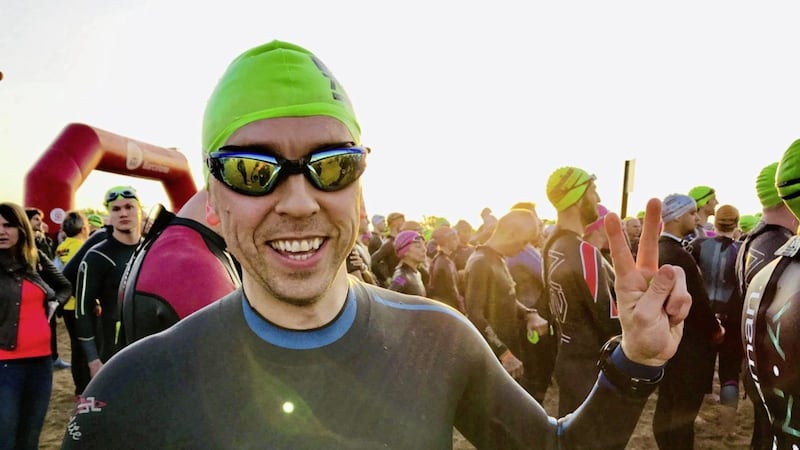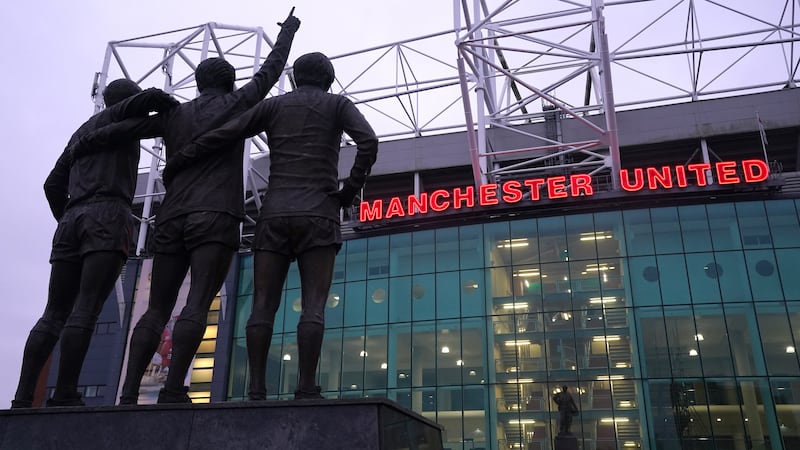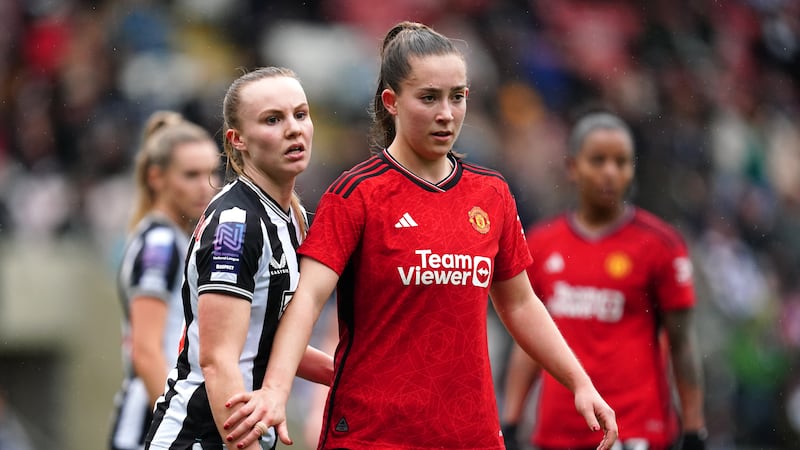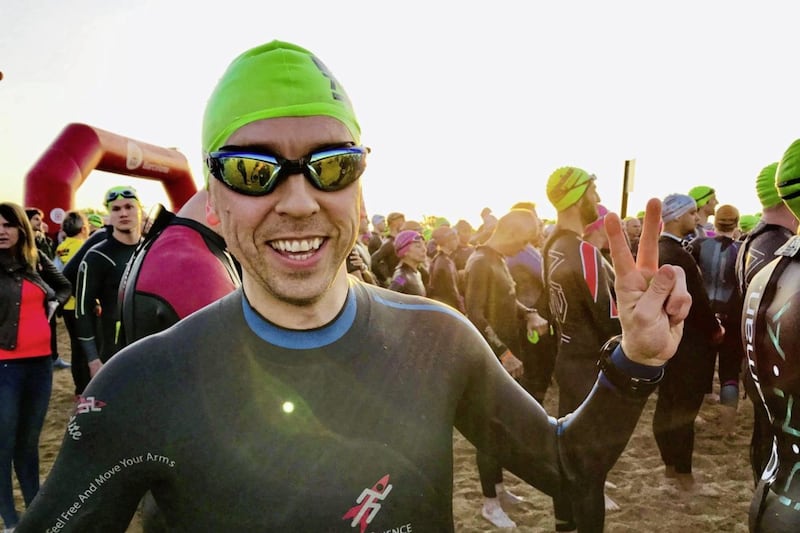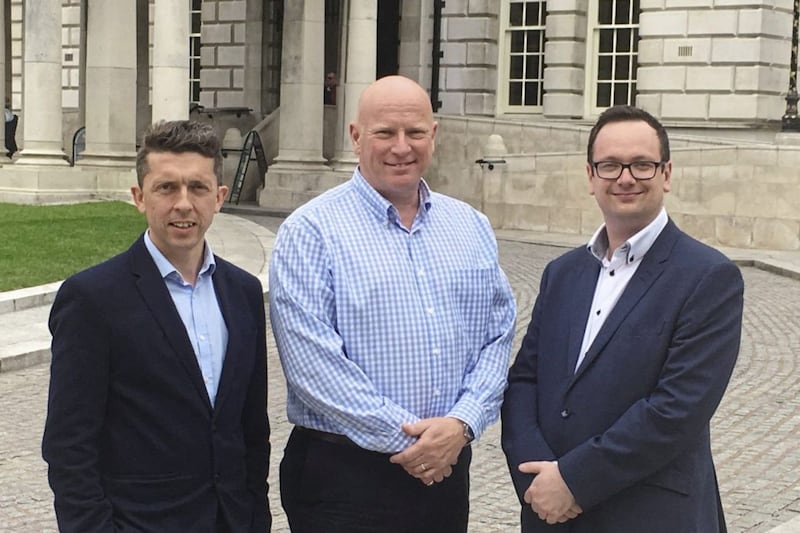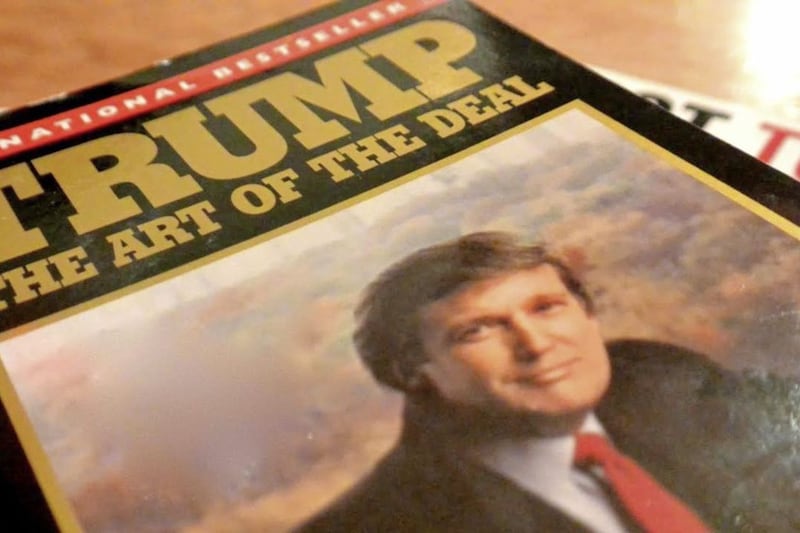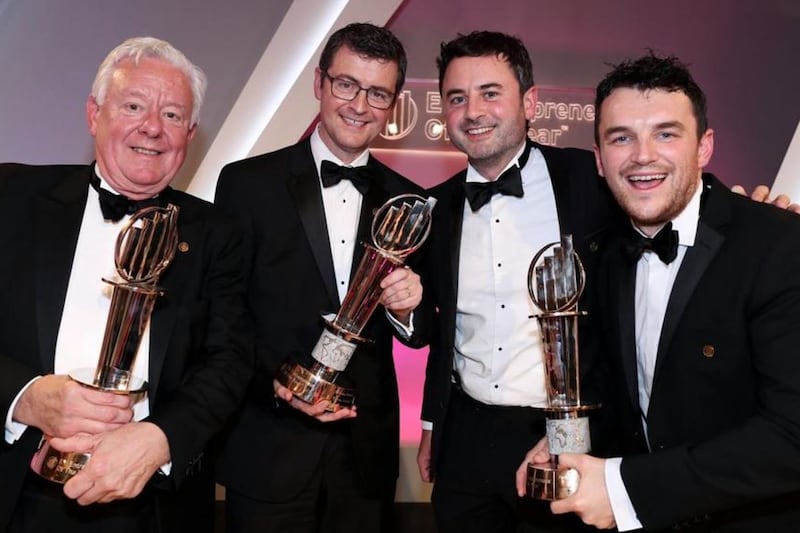"If you take anything from my story it has to be: Never give up, you can take control of your illness and your life, you can have a business and a family, you can realise your potential.”
Conor Devine
ARMS and legs churn the water all around him and that means the race has begun. Then it’s Conor Devine against the sea, Conor Devine against the hills, Conor Devine against the hard road… Inch by inch, minute after minute…
Thirteen hours in and his tired body screams ‘STOP!’ so he thinks of the good things in his life: His two children, his family, his health, his business… He endures, he perseveres to the end.
This man will never stop. Anyway, after what he has come through since Multiple Sclerosis tore his life apart and left him broken and lost, even an Ironman event – all 140 miles of it – is a Sunday stroll.
He gives thanks for being able to do it at all and knows that he’s inspiring the world to follow in his footsteps.
His journey began in Cookstown with “a ball in my hands or at my feet”.
As a talented Gaelic footballer he lined out for the Fr Rocks club and, in soccer, he captained Northern Ireland Schoolboys and played in three Milk Cup tournaments.
When he was 16 he went to England for trials with Coventry City, who were then a Premier League club.
“I always wanted to play for Man United,” says Devine, now 41.
“I wanted to be a professional footballer and I believed I could be one, but it didn’t work out unfortunately.
“After a few trials, they thought I was too small and that was a major disappointment because I had my heart set on it. I thought the hardest part was getting a trial, but it just wasn’t to be.”
One door was shut, so he refocused on the next challenge, got his head down at school, passed his exams and packed his bags for the University of Ulster.
Sport remained a constant backdrop to his studies at Jordanstown. He won an All-Ireland at full-forward with the Poly Freshers, represented Ireland at the World Student Games in soccer and went on to become a sought-after, goalscoring midfielder in the Irish League.
After starting out at Dungannon Swifts, Marty Quinn signed him for Cliftonville – playing for the Reds was always a dream – and after a second stint at Dungannon, Colin Malone brought him along when he was appointed manager of Glenavon.
At Mourneview, Devine played central midfield with Rodney McAree and with Garry Haylock banging in the goals up front and former Spurs and Northern Ireland star Ger McMahon - “the best player I’ve ever played with” – pulling the strings, the Lurgan Blues pushed Linfield all the way to the league title.
Off the field, he’d qualified as a chartered surveyor and began working in the property industry in 2004. He was a company director within three years.
“At 26, I was a director in a property company and playing Irish League football and life was great,” he says.
And it carried on like that for the next two years. A success in business and sport, he lived a life many of us dream about – but it all came crashing down in the blink of an eye on the first morning of a holiday in Mauritius.
“I went for my breakfast, I was sitting at the table and my hand started to go numb,” he recalls.
“It just started like that (clicks his fingers). I imagine it’s like getting bitten by a snake and venom traveling through your body.
“My right arm went pins-and-needles and over the next 24 hours my whole body went numb. It spread up my arm, into my head and down the other side.
“I was rushed to hospital that night and I spent the next week there. I had all sorts of scans and tests but they couldn’t find anything, the doctors thought it was a virus and it was nothing to worry about.”
It wasn’t a virus. His health steadily deteriorated. He was ill for the next 12 months, he couldn’t go to work and struggled to walk, never mind play football. There was constant pain in his head and all over his body and he genuinely believed he was dying.
“I didn’t understand what was going on,” he says.
“I know now that some kind of virus triggered my nervous system and my immune system was attacking itself.
“Something got into my body and caused upheaval. Something happened in my body that morning for my nervous system to react like it did.
“If I hadn’t been there [in Mauritius] I might never have experienced this. But that’s part of life. Illness and disease and misfortune is part of your journey and I was very unfortunate.”
Test followed test. Was it cancer? Or Motor neurone disease? Doctors searched for an answer but he was left in the dark over “12 months of torture” until, finally, an answer was found.
“After an MRI exam, the neurologist was able to identify lesions in my brain which were in line with an MS diagnosis,” he explains.
“He diagnosed me with Multiple Sclerosis on 21st of August, 2007, which is my birthday.”
And then he thought: ‘Where do I go from here?’
At first the answer was down, deep down into the depths of depression as he searched for health and struggled to come to terms with how his life had been ripped apart.
In the space of 12 months the footballer/businessman was gone, so who was he now? What did the future hold? He searched for answers but was surrounded by negativity.
“They tell you that 25 per cent of people who have MS will be in a wheelchair within 10 years,” he says.
“It’s physically hard to deal with because of the symptoms and it is mentally crushing and I went into a dark hole of thoughts like: ‘Will I be able to walk? How am I going to pay bills? Or work? What’s going to happen to my family?’ It’s a negative space which can spiral out of control very quickly.”
From 2007 until 2010 his life was a lonely “hell”.
“I was very depressed, I had suicidal thoughts – negative, dark thoughts – which I think are normal whenever you’re in a hole like that and you’re trying to figure out: ‘What is the point?’ ‘How long is this going to go on for?’
“You think you’re a burden on everyone. Normal tasks like going to the shop were tricky because I had balance problems, my walking wasn’t great. It was a very, very
dark time.”
He plumbed the depths of despair, sinking lower and lower. Eventually he reached the bottom and, slowly, began to work his way back up. Inspiration came from an unlikely source: a US TV chat show host called Montel Williams (inset).
“I couldn’t find any body in Ireland or the UK who was living well with MS,” he explains.
“I had nobody to inspire me that there was a chance I could fight this thing or beat this thing. The only stories I could find about living with MS were negative ones – there was no positivity out there at all.
“I found Montel Williams online in 2010. He was living with MS, he had his own TV company, he was training in the gym every day, he was writing books, he was an entrepreneur… He was doing all the things that I thought you shouldn’t be doing with an MS diagnosis.
“With MS you are pigeon-holed to believe that you have to take it easy, slow down and that generally things are going to get worse.
“It’s very negative condition, it’s just a dream-stealer of a diagnosis and once you get it you just think: ‘My life is over’. That’s just the bottom line and it’s still the case, but I’m doing my bit to try and change that perception.
“At that time, if you went on to MS charity website, all you saw was people in wheelchairs or walking with canes.
“You aren’t seeing too many people running triathlons and marathons and doing ironmen events. I am trying to say to people: ‘You can have an MS diagnosis but you can also do this, this and this.
“When I saw Montel’s stuff online it gave me a lot of hope. We’re all looking for hope and it gave me a bit of a spark, I thought: ‘If this guy can do all these things then why can’t I?’ I made a conscious decision in 2010 to fight back against the condition. I was going to do everything in my power to get my health back.”
He walked into a gym one day and that was the start. Some days he’d complete his work-out and sometimes he left the gym choking back tears of frustration because his body couldn’t do what he wanted it to. But he kept going back.
“I always turn up,” he says.
“Eighty per cent of anything is turning up, so if I could just get to the gym the training would look after itself. Turning up is the key.”
He was invited to run the Belfast Marathon back in 2011. As he said, people with MS didn’t run marathons then, but he did. He pushed himself along over the distance for four hours and 36 minutes until he reached the finishing line.
He ran another and his time was quicker. Then another and another until he needed a fresh challenge and looked into triathlon.
He couldn’t swim so, aged 37, he taught himself to swim and he completed his first triathlon.
“Now I’ve done a load of them,” he says with a smile.
Listening to him talk, you can’t help but be inspired and think to yourself: ‘I’m going to do a triathlon’ but the difference between Conor Devine and most of us is that his thoughts don’t stay in some dusty inner in-tray.
When he has an idea he acts on it and, after the triathlon stage, he turned his attention to completing the toughest endurance race of them all.
An Ironman is a lung-busting, non-stop race that comprises a 2.4-mile swim, a 112-mile cycle and then a full marathon. He began with a half-Ironman and is now in week 12 of a 23-week training regime in preparation for his third full Ironman which takes place in Cork in June.
He has been on a plant-based diet for the last two and-a-half years and, after injecting daily for nine years, has stopped taking medication.
He is in excellent health and he’s doing everything in his power to make sure he stays that way.
“My form is better and my symptoms have reduced,” explains Devine, a devoted single parent of eight-year-old Lilyanna and Conor (5).
“My plan is to keep going, keep training, keep eating well and hopefully my health will stay well. MS is very unpredictable and I could have a massive attack at any point, nobody really knows.
“I don’t take it for granted, I could take poor health in the next few months – but so could anyone. I try to get stronger every day and that’s all I can do.
“It’s just hard work and I don’t know anybody who is working harder than me and I say to people: ‘Don’t wait until you’re diagnosed to start taking control of your health, look after yourself now – exercise, eat well…’ If you take anything from my story it has to be: Never give up, you can take control of your illness and your life, you can have a business and a family, you can realise your potential.”
One life ended that morning in Mauritius, but another began and now he feels he has discovered his true calling.
“I think my mission in life is to help people and share experiences,” he says.
After our chat he heads off to swim a mile and, later, he’ll do a turbo bike session so he’ll be ready for Cork when June comes.
Every inch he covers is another victory as the Ironman wins his battle and inspires us to win ours.
